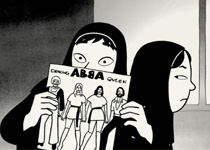The week's best film, Persepolis, won the Jury Prize at the Cannes Film Festival 2007 for tackling the sensitive topic of religion and identity in the most unexpected and wonderful way — through hand-drawn animation.
Vivid, honest and surprisingly tender, Persepolis is the dark horse in the Oscar race for Best Animation, competing against Ratatouille and Surf's Up. And even though Ratatouille is obviously going to win, Persepolis deserves a sizeable audience of its own because it's a wonderful triumph of traditional 2-D cartoon and classic unpretentious storytelling.
Based on Marjane Satrapi's acclaimed graphic autobiography, Persepolis tells the true and tumultuous tale of Marjane who was born in Tehran in 1975. As the country goes through various changes of leadership over the years, Marjane is forced to relocate her identity within the shifting socio-political grid of her country — a tall order for someone so young.
As a teenager, Marjane is sent to Vienna where she tries to fit in with mullet-haired punk crowd. But she ends up feeling lonelier than ever. She returns to Tehran to come to terms with who she is, but realises that her hometown too has changed beyond recognition. Will she ever find a place to call "home" again?
Persepolis portrays Marjane and a wonderful array of supporting characters with warmth, understanding and intelligence. It also manages to compress two decades of Tehran's historical upheavals into a few choice sequences.
We witness how, for people living in some countries, the political constantly weighs upon the personal and forcibly shape the course of their lives. At first glance, Persepolis may not be the sort of film that audiences growing up in relatively stable consumerist societies like Singapore and Hong Kong can easily understand. But this is just the sort of film that we need to see to open our eyes to the bigger world.

19 Feb 2008
Persepolis
Director: Vincent Paronnaud, Marjane Satrapi
Language: English, French, Persian, German with English subtitles
Starring: Chiara Mastroianni, Catherine Deneuve, Gena Rowlands, Sean Penn, Iggy Pop
Awards: Jury Prize, Cannes Film Festival Special Jury Prize, Cinemanila International Film Festival Best Foreign Language Film Audience Award, Sao Paulo International Film Festival Most Popular Film, Vancouver International Film Festival Sutherland Trophy, British Film Institute Awards Freedom of Expression Award, National Board of Review, USA Best Animated Film, New York Film Critics Circle Awards Best Animation, Los Angeles Film Critics Association Awards
Release: 2008-02-19
